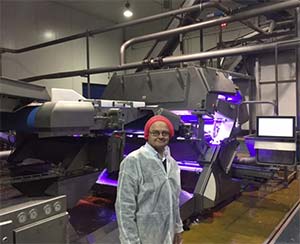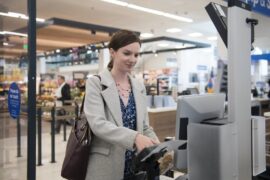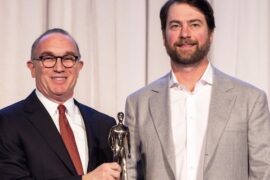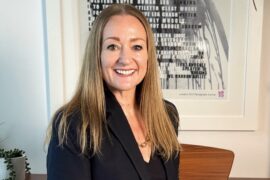By John Saulnier, FFB Editorial Director
 Happy 2018, dear reader! As the New Year is rung in, it is customary to take stock of the past 12 months and size up future prospects. For some more than others, out with the old and in with the new promises welcome relief – especially for folks who have endured trying times and conquered adversity along with way.
Happy 2018, dear reader! As the New Year is rung in, it is customary to take stock of the past 12 months and size up future prospects. For some more than others, out with the old and in with the new promises welcome relief – especially for folks who have endured trying times and conquered adversity along with way.
Having overcome health and business challenges during 2017, Herwig Dejonghe, the chief executive officer of Antarctic Foods Aquitaine SAS and longtime frozen food industry champion, may be counted among those who are optimistically looking ahead .
On June 19, only three weeks after being released from a hospital in Belgium following successful emergency coronary surgery precipitated by a heart attack suffered while sailing in the North Sea, the telephone rang as he was recuperating at home. The good news was that it was not a worrisome call from his cardiologist, whose post-operative prescription insisted on an extended period of rest and relaxation. The bad news was that the conversation was anything but relaxing, as Dejonghe was alarmingly informed that his frozen vegetable factory in Ychoux, southwestern France, was on fire.
 CEO Herwig Dejonghe inspects a high-precision VERYX B140 digital sorter at his Antarctic Foods Aquitaine factory in France. The frozen vegetable plant continues to gear up following a fire that shut it down for about a month. Full operational capacity is to resume in May, just in time for the early carrots season. Just a month before, major investments in maintenance and equipment were made to further upgrade the facility. Now an accidental blaze had wreaked havoc in the maintenance workshop and boiler room. Luckily there were no casualties among employees, and a firewall stopped the flames from spreading beyond the compressor compartment, thus sparing the processing area. Unfortunately, however, widespread collateral damage forced a shutdown of the plant.
CEO Herwig Dejonghe inspects a high-precision VERYX B140 digital sorter at his Antarctic Foods Aquitaine factory in France. The frozen vegetable plant continues to gear up following a fire that shut it down for about a month. Full operational capacity is to resume in May, just in time for the early carrots season. Just a month before, major investments in maintenance and equipment were made to further upgrade the facility. Now an accidental blaze had wreaked havoc in the maintenance workshop and boiler room. Luckily there were no casualties among employees, and a firewall stopped the flames from spreading beyond the compressor compartment, thus sparing the processing area. Unfortunately, however, widespread collateral damage forced a shutdown of the plant.
What to do then, as large quantities of contracted green beans and peas were being harvested and en route to the temporarily closed factory for processing?
Dejonghe immediately got in touch with colleagues in the north of Spain and south of France. Fortunately a number of them had spare production capacity and agreed to lend a hand. Over the next four weeks vegetables harvested from the fertile fields of the Nouvelle-Aquitaine farming region were trucked to eight independent plants near and far for trimming, cutting, blanching and freezing.
“After the fire, even though we stopped production, very little produce was lost – but the delay in processing the crops was accentuated by the fact that for the most part harvests came in early,” said Dejonghe.
A little more than one month following the blaze, packing resumed at the BRC-, Ecocert- and IFS-certified factory in Ychoux, though total reconstruction and repair of all the damage will not be completed before May of 2018.
“I am indeed proud that we managed to finish our 2017 vegetable season without letting down any suppliers or customers,” the chief executive officer told FrozenFoodsBiz.com shortly before Christmas.
He had just returned from an inspection of the plant, where all systems were “go” as the production of frozen baby carrots was in full swing. The recently installed VERYX B140 digital sorter from Key Technology, which went into action at the end of the green bean season, was working overtime.
In the months ahead, Antarctic Foods Aquitaine will primarily be engaged in packing diced, sliced and shredded carrots. Its overall portfolio includes sweet corn, salsify, romano beans, wax beans and Parisian potatoes.
Elaborating on the current state of the company in a recent letter to customers, Dejonghe wrote: “Every day of every week we are heading towards the time when we will once more be 100% operational. But we are not there yet…We assure you that we are doing all we can to speed up the process, and sincerely apologize for the inconvenience and disruption this has caused you. We hope you will bear with us as we recover from the disaster…2018 will be a year of consolidation, and will allow us to get rid of all troubles occurred in 2017.”
Godspeed Herwig!




